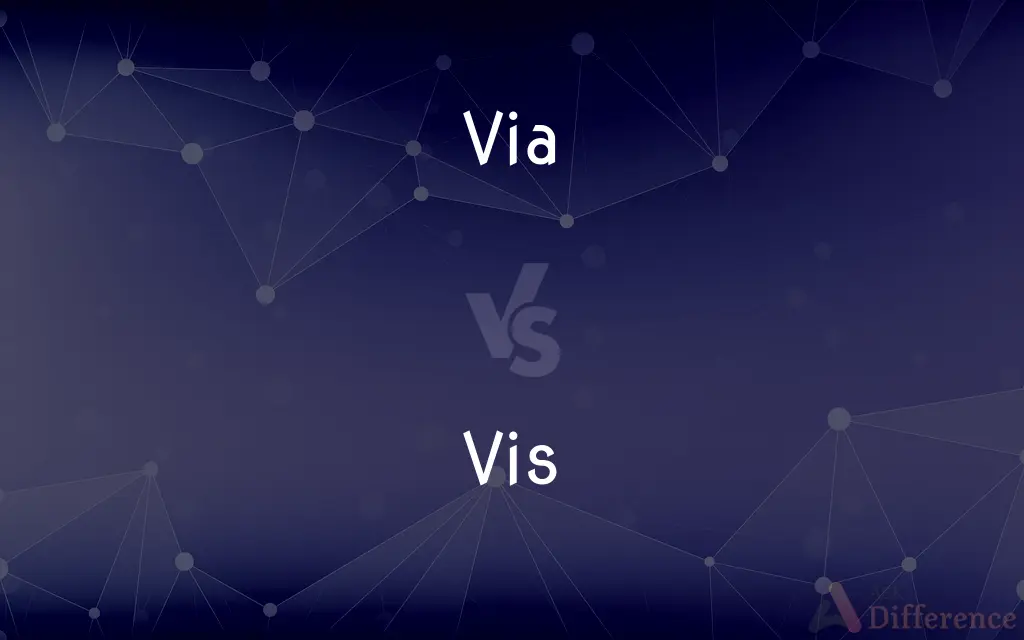Via vs. Vis — What's the Difference?
Edited by Tayyaba Rehman — By Maham Liaqat — Updated on April 24, 2024
"Via" is primarily used to denote the means or route taken, whereas "vis" is a Latin term often used in legal contexts to mean "in the capacity of."

Difference Between Via and Vis
Table of Contents
ADVERTISEMENT
Key Differences
"Via" is commonly used in everyday English to describe the method or path through which something is achieved, such as "sending a document via email." On the other hand, "vis," a less common term, is primarily found in formal or legal documents.
In transportation or communication contexts, "via" specifies the route or medium, like "traveling to Europe via Iceland." In contrast, "vis" is rarely used outside legal or formal settings where it signifies the role or capacity someone holds, such as "acting vis a vis the manager."
"Via" is derived from the Latin word meaning road or way, reflecting its use in indicating paths or methods. Conversely, "vis" is also from Latin, but it translates to force or power, hinting at its usage in expressing authority or capacity in legal terms.
The flexibility of "via" allows it to be integrated into various scenarios beyond just physical routes, including processes and methods, such as "learning via online courses." Whereas "vis" is specifically used to delineate official or formal roles, not applicable in casual contexts.
While "via" is a preposition in English, "vis" is often part of the phrase "vis-à-vis," meaning facing or in relation to, further showing its limited use compared to the versatile "via."
ADVERTISEMENT
Comparison Chart
Part of Speech
Preposition
Noun (in specific uses)
Common Usage
General, everyday
Formal, legal
Meaning
Route, method, by way of
In the capacity of
Example Context
"Sent via email"
"The attorney, acting vis a vis the client"
Etymology
Latin for "road"
Latin for "force"
Compare with Definitions
Via
Route or way.
She traveled to the city via the old highway.
Vis
Power or force (Latin origin).
The term 'vis' often relates to legal authority.
Via
Using.
She secured the job via her networking skills.
Vis
In the capacity of.
He spoke vis a vis the company's spokesperson.
Via
Through the medium of.
The news was broadcast via satellite.
Vis
Legal standing.
The rights were granted vis her status as a trustee.
Via
By way of.
The package was delivered via courier.
Vis
Relative position.
Negotiations took place vis a vis their market positions.
Via
By means of.
He communicated via sign language.
Vis
Facing.
The restaurant is situated vis-à-vis the museum.
Via
By way of
Went to Pittsburgh via Philadelphia.
Vis
Force; energy; might; power.
Via
By means of
Sent the letter via airmail.
Vis
Alternative spelling of viss
Via
A main road or highway, especially in ancient Rome. (Mainly used in set phrases, below.)
Vis
Clipping of visualization
Via
(electronics) A small hole in a printed circuit board filled with metal which connects two or more layers.
Vis
Clipping of visual
Via
By way of; passing through.
They drove from New York to Los Angeles via Omaha.
You can enter the building via the western gate.
Vis
Clipping of visibility
Via
By (means of); using.
I'll send you the information via e-mail.
Vis
Clipping of visual
Via
(obsolete) Away! Be off!
Vis
Clipping of visualize
Via
A road or way.
Vis
Force; power.
Via
By the way of; as, to send a letter via Queenstown to London.
Vis
Physical force.
Common Curiosities
What contexts is "via" commonly used in?
"Via" is used in contexts describing routes, methods, or mediums in both physical and abstract senses.
Can "via" and "vis" be used interchangeably?
No, "via" and "vis" serve different purposes and are not interchangeable.
What does "vis" signify in legal documents?
In legal contexts, "vis" denotes 'in the capacity of' or 'with respect to.'
How is "vis" used in everyday communication?
"Vis" is not typically used in everyday communication but is reserved for formal or legal expressions.
Is "vis" commonly understood by non-lawyers?
"Vis" may not be commonly understood in everyday use and is more familiar within legal and formal contexts.
What is the practical utility of "via"?
"Via" is versatile and practical for indicating methods, routes, or mediums in various contexts from travel to technology.
What does "vis-à-vis" mean in French and how is it used in English?
"Vis-à-vis" in French means "face to face." In English, it's used to denote comparison or contrast, as well as literal opposing positions.
How is "vis" typically used in sentences?
"Vis" is often part of the phrase "vis-à-vis," meaning facing or in relation to, as in "discussing budget vis-à-vis last year's spending."
Can "via" be used in digital communication?
Absolutely, "via" is commonly used in digital communication to describe the means, such as "via email" or "via social media."
What type of word is "vis" in grammatical terms?
"Vis" is primarily used as a noun in legal or formal settings.
Is "via" a Latin word?
Yes, "via" is derived from Latin, where it means "road" or "way."
What are the origins of the word "via"?
"Via" originates from Latin, where it literally means "road" or "way."
Is "via" used internationally?
Yes, "via" is used in many languages and is recognized internationally as indicating the method or route by which something is done.
Can "vis" be used in casual conversation?
"Vis" is rarely appropriate for casual conversation due to its formal and specific use, primarily in legal and structured discussions.
Are there synonyms for "via" that can be used in everyday English?
Yes, words like "through," "by," or "using" can often replace "via" depending on the context.
Share Your Discovery

Previous Comparison
Practical vs. Theoretical
Next Comparison
Butterish vs. ButterAuthor Spotlight
Written by
Maham LiaqatEdited by
Tayyaba RehmanTayyaba Rehman is a distinguished writer, currently serving as a primary contributor to askdifference.com. As a researcher in semantics and etymology, Tayyaba's passion for the complexity of languages and their distinctions has found a perfect home on the platform. Tayyaba delves into the intricacies of language, distinguishing between commonly confused words and phrases, thereby providing clarity for readers worldwide.














































